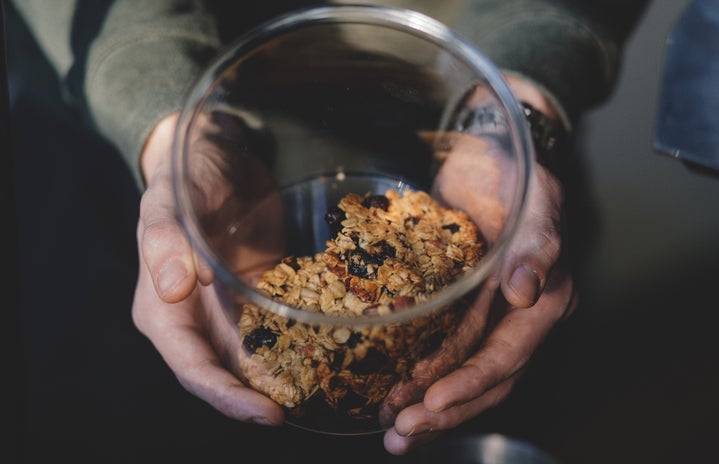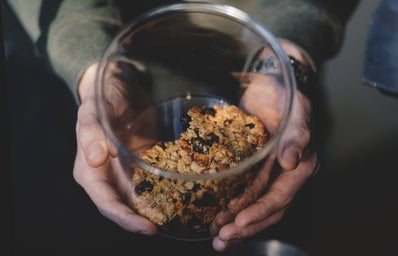Name: Rachel Reiss
Age: 21
Year: third-year advanced degree candidate
Field of study: Master of Science in management
Her Campus: What projects have proven most effective in creating a more sustainable UF?
Rachel Reiss: “Oh, there are so many! I really enjoyed getting some high-volume events green-certified. For example, we green-certified Interfraternity Council’s Chicken Wing Charity, a Dance Marathon fundraiser involving 22,000 chicken wings and some hungry fraternity guys, by introducing composting. We diverted a lot of waste and brought attention to sustainable event certification. We also participated in the Close the Loop Challenge, a massive clothing drive sponsored by the nonprofit DoSomething.org and powered by H&M, in which we collected 1,200 items of clothing to be donated, repurposed and sold in open-air markets in Africa. In November, we launched the Kill The Cup campaign, a national initiative between 16 universities and on-campus coffee shops to reduce waste from disposable cups. By partnering with the Library West Starbucks, running a social media campaign and tabling, we ‘killed’ over 1,398 cups in a month and took first place, receiving a social impact grant. We are currently piloting food composting in Greek kitchens.”
HC: What is the most difficult aspect in engaging students in environmental projects?
RR: “That’s a tough one. I think, at UF especially, students are so involved as it is that it’s just a matter of encouraging them to make the time to engage. I think the term ‘environmental’ or ‘going green’ has a stigma of being a kale-eating, tree-hugging hippie who is ‘one with nature’ — not that there’s anything wrong with that. They see engagement as a chore rather than as something fun. However, what students don’t realize is that there are so many ways to integrate sustainable lifestyle changes into their daily habits.”
HC: How have your accomplishments exceeded your initial goals for this organization?
RR: “I never imagined how the scope of Greeks Going Green would grow within these two years. I stepped into my role as president just when the previous year’s leadership graduated, and I brought a commitment to reactivate GGG’s presence on campus beyond the two main projects it had been doing for years: gameday recycling and frat woods clean-ups. Since then, reflecting on our days out at the teaching farm, our monthly meetings with guest speakers, our participation in UF’s first annual Global Divestment Day, our two recent projects, Kill the Cup and Close the Loop Challenge, as well as our membership and representation, which have nearly tripled… I could not be more optimistic for the continued room for improvement. I wouldn’t say I have met all of my goals, though, because the more we achieve, the higher I set the bar.”
HC: Do you believe your message has reached students beyond the Greek community?
RR: “I certainly hope so. As a Greek myself with many friends who aren’t in sororities or fraternities, I understand how isolated the Greeks can seem from the non-Greeks. In fact, one of my goals with this organization is to bridge that divide. Although we are Greeks Going Green, several of our members are also involved in Gators Going Green, Sustainable UF, the Institute of Food and Agricultural Science and the College of Agricultural and Life Sciences. Much of our previous success is due to these partnerships with students outside of the Greek community who have an interest in sustainability. We are always open to hearing suggestions and collaborative opportunities from non-Greek students. The Close the Loop Challenge was actually introduced to me by a non-Greek student — major thanks to her! We always try to make ourselves accessible to the the entire UF community. We’ve actually been fortunate enough to receive press coverage and grow a huge social media presence. We’ll be out in Turlington with the UF Sustainability Hut in a few weeks, tabling alongside them. Come out and sign the water-reduction pledge!”
HC: What are the long-term objectives for your sustainable movement?
RR: “To be simply that: sustainable. My greatest hope is that when I take a step back from GGG next year as a full-time graduate student, and even after I graduate, the organization will continue in full force with an ambitious cohort of students who dream even bigger and act even faster to create impactful and innovative change on UF’s campus. These past two years have built a foundation; now we have to build the structure. I would love to see composting expand to all houses on row, and I would love to have some new workshops out at the teaching farm. Even better, it would be great to grow our farm-to-school partnership that we just launched and continue to serve the community with our passion for creating a more sustainable table. I would like for us to continue everything we have started so that we may continue our record of upward progress and help move UF toward a greener, cleaner and more efficient future. As a result of these endeavors, I hope to create more informed and socially responsible citizens because that is exactly what the world needs today.”

